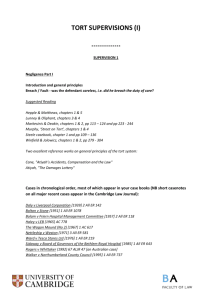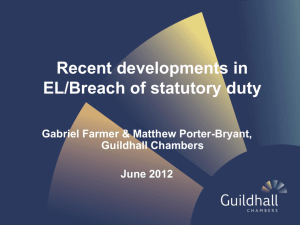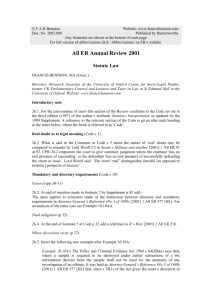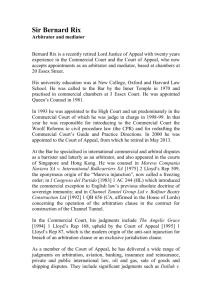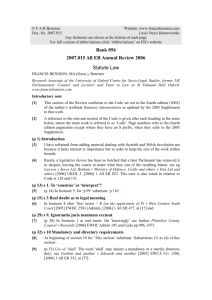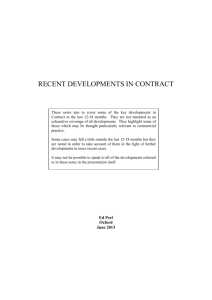curzon_6e_update_Sep03
advertisement
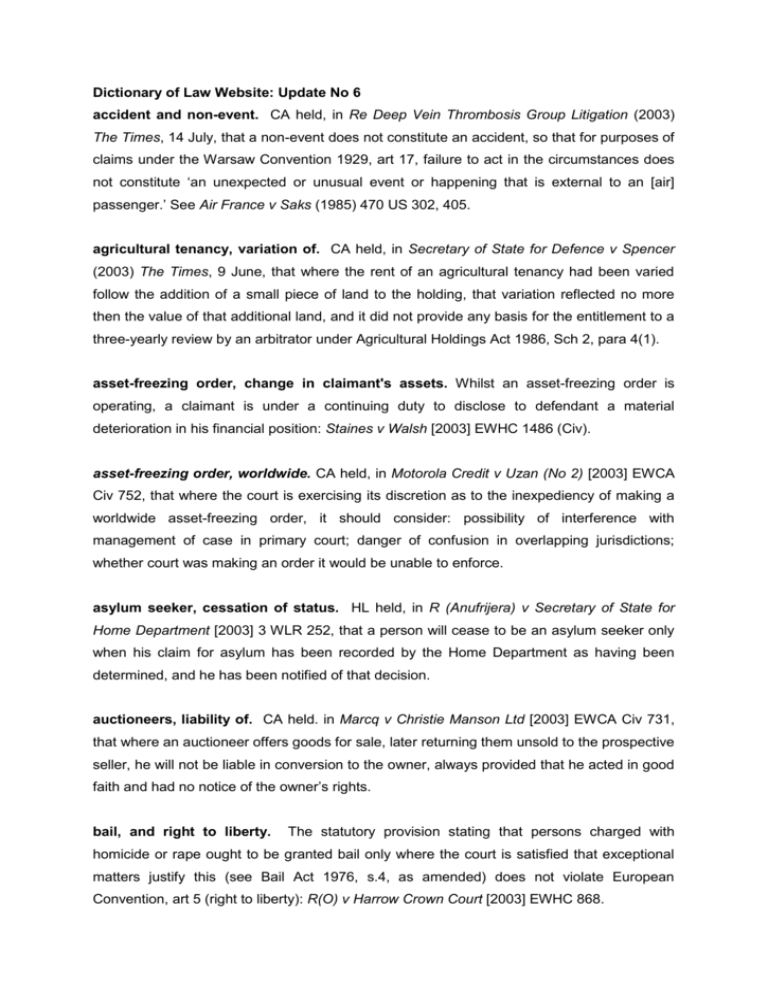
Dictionary of Law Website: Update No 6
accident and non-event. CA held, in Re Deep Vein Thrombosis Group Litigation (2003)
The Times, 14 July, that a non-event does not constitute an accident, so that for purposes of
claims under the Warsaw Convention 1929, art 17, failure to act in the circumstances does
not constitute ‘an unexpected or unusual event or happening that is external to an [air]
passenger.’ See Air France v Saks (1985) 470 US 302, 405.
agricultural tenancy, variation of. CA held, in Secretary of State for Defence v Spencer
(2003) The Times, 9 June, that where the rent of an agricultural tenancy had been varied
follow the addition of a small piece of land to the holding, that variation reflected no more
then the value of that additional land, and it did not provide any basis for the entitlement to a
three-yearly review by an arbitrator under Agricultural Holdings Act 1986, Sch 2, para 4(1).
asset-freezing order, change in claimant's assets. Whilst an asset-freezing order is
operating, a claimant is under a continuing duty to disclose to defendant a material
deterioration in his financial position: Staines v Walsh [2003] EWHC 1486 (Civ).
asset-freezing order, worldwide. CA held, in Motorola Credit v Uzan (No 2) [2003] EWCA
Civ 752, that where the court is exercising its discretion as to the inexpediency of making a
worldwide asset-freezing order, it should consider: possibility of interference with
management of case in primary court; danger of confusion in overlapping jurisdictions;
whether court was making an order it would be unable to enforce.
asylum seeker, cessation of status. HL held, in R (Anufrijera) v Secretary of State for
Home Department [2003] 3 WLR 252, that a person will cease to be an asylum seeker only
when his claim for asylum has been recorded by the Home Department as having been
determined, and he has been notified of that decision.
auctioneers, liability of. CA held. in Marcq v Christie Manson Ltd [2003] EWCA Civ 731,
that where an auctioneer offers goods for sale, later returning them unsold to the prospective
seller, he will not be liable in conversion to the owner, always provided that he acted in good
faith and had no notice of the owner’s rights.
bail, and right to liberty.
The statutory provision stating that persons charged with
homicide or rape ought to be granted bail only where the court is satisfied that exceptional
matters justify this (see Bail Act 1976, s.4, as amended) does not violate European
Convention, art 5 (right to liberty): R(O) v Harrow Crown Court [2003] EWHC 868.
bankrupt, automatic discharge of. An ex parte interim order which effectively suspends
the automatic discharge of a bankrupt can be made where the court believes that such an
order is appropriate and is needed urgently: Bagnall v Official Receiver [2003] EWHC 1398
(Ch).
bankruptcy.
HL held, in Mulkerrins v Pricewaterhouse Coopers (2003) The Times, 1
August, that a trustee in bankruptcy could have no interest in a right of action which a
bankrupt wished to bring against former advisers; the bankrupt was entitled to bring such an
action in his own name.
bias, appearance of.
HL held, in Lawal v Northern Spirit Ltd [2003] UKHL 35 (and
reversing decisions in CA and EAT), that where counsel appears before the Employment
Appeal Tribunal which includes some lay members with whom he has participated in
hearings as a part-time judge, there was a possibility of subconscious bias in the minds of
the lay members. The practice ought to be discontinued.
breath tests. Where a driver has provided two breath specimens, but the police have
reasonable cause to believe that the breathalyser was not providing reliable readings, the
driver can be given the option of providing two further specimens rather than specimens of
urine and blood: Stewart, v DPP [2003] EWHC 1323 (Admin).
chancel repairs, liability of lay rectors for. HL held, in Parochial Church Council of Aston
v Wallbank [2003] UKHL 37, that liability for chancel repairs in the case of rectorial land,
runs with the land; it does not constitute interference with a lay rector’s right to peaceful
enjoyment of his land.
Chief Justice, Deputy. The first-ever Deputy Chief Justice, who will assist the Lord Chief
Justice with various administrative duties, has been appointed, as from 14 July 2003. He is
Lord Justice Judge.
child, identification of. CA held, in Re S (A Child) (Identification: restriction on publication)
[2003] EWCA Civ 963, that', in relation to the court’s inherent jurisdiction to issue an order
prohibiting the identification of a defendant in a criminal trial, in the interests of a child not
concerned in that trial, there should be a balancing of the child’s rights under the European
Convention, art 8, against the right to freedom of expression.
compensation. CA held, in Lowther v Chatwin (2003) The Times, 4 August, that, in relation
to the prevention of double recovery in damages, the phrase ‘compensation for earnings
lost,’ in Social Security (Recovery of Benefits) Act 1997, s.8, Sch 2, refers, in the context of a
self-employed claimant, to turnover lost, rather than actual income or net profit lost.
contract, variation of. In the case of a contract required to be in written form, waiver of a
term in that contract (in the form of a forbearance) can be made orally: MSAS Global
Logistics v Power Packaging Inc (2003) The Times, 25 June.
currency of damages award, determination of.
CA held, in Lesotho Development
Authority v Impregilo SPA [2003] EWCA Civ 1159, that, in the case of a contract identifying
currency of account and payment, and specifying proportions of contractual debt to be
apportioned in different currencies, then, under Arbitration Act 1996, s.48(4), it is
unnecessary for UK arbitrators to convert substantive debt in foreign currency into English
currency, so as to make an award.
director. In the case of a company whose affairs are managed by a board of directors or
similar body, the term means a member of that board or similar body; in the case of a
company whose affairs are managed by a single director or similar person, means that
director or person; in the case of a company whose affairs are managed by its members,
means a member, and includes any person who is to be or has been a director: Income Tax
(Earnings and Pensions) Act 2003 s.434(1).
disclosure of material evidence. European Court of Human Rights held, in Dowsett v UK
(Application No 39482/98) (2003) The Times, 12 July, that material evidence which is of
relevance to the defence must be submitted to the trial judge for decisions in relation to
matters of disclosure at the time when it might serve most effectively to protect rights of the
defence.
discrimination, claim by soldier. CA held, in Mangera v MOD (2003) The Times, 12 July,
that, in the case of a soldier who alleged discrimination (failure to supply him with halal
meat), he had failed to comply with the Army’s internal redress procedures (see Race
Relations (Complaints to Employment Tribunals) (Armed Forces) Regulations (SI 97/2161),
so that the European Convention art 6 (right to fair trial) had no application to his
discrimination claim under Race Relations Act 1976, s.4(2).
discrimination, ex-employees and. HL held, in Relaxion Group plc v Rhys Harper [2003]
UKHL 33, that an employment tribunal could hear complaints of discrimination under
legislation referring to sex, race, disability, by applicants employment had terminated. See
Race Relations Act 1976, s. 27A, inserted by Race Relations Act 1976 (Amendment)
Regulations 2003.
discrimination for sexual orientation. HL held, in Macdonald v MOD [2003] UKHL 34, that
the Sex Discrimination Act 1975 related solely to the prohibition of discrimination on the
basis of gender; it did not involve discrimination based on sexual orientation (eg,
lesbianism).
discrimination, sex, in commercial partnership.
Sex Discrimination Act 1975 has
application to a two-partner firm (of medical practitioners); hence, an expelled partner may
bring proceedings against the remaining partner in the latter's name: Dave v Robinska
(2003) 153 NLJ 921.
documents, power to obtain. HL held, in In Re Pantmaenog Timber Ltd (2003) The Times,
7 August, that the Official Receiver was empowered to ask for documents from persons who
had information concerning directors of a company in liquidation where the purpose was to
obtain evidence which could be used against a former director involved in disqualification
proceedings.
duress, defence of. CA held, in R v Safi [2003] All ER (D) 81, that the jury is to be directed
on the basis of terms emerging from authority. It is incorrect to decide that there must be a
threat in fact, rather than circumstances which defendant reasonably believed to constitute a
threat, before a defence of this type can be put forward. Further, if the law should be
changed, this is a matter for Parliamentary intervention and not for the courts.
entrapment and human rights. European Court of Human Rights held, in Edwards and
Lewis v UK (Application No 39647/98) (2003) The Times, 29 July, that some procedures
used in relation to the disclosure of evidence and the practice of entrapment failed to protect
the interests of the accused and to ensure equality of arms in subsequent court proceedings,
resulting in a breach of the European Convention relating to fair trial provision (art 6.1).
equipment, destroyed, value of. CA held, in Ali Reza Delta Transport v United Arab
Shipping Company (2003) The Times, 27 May, that, in relation to equipment destroyed in
Saudi Arabia, its market value ought to be evaluated and assessed at the time and place
where it had been destroyed; this necessitated expert evidence of what was ‘fair and
reasonable’ in the circumstances, and this should include the claimant’s lowest cost option.
European Parliament, UK representatives. Under European Parliamentary Elections Act
2002, s.1, as substituted by European Parliament (Representation) Act 2003, s.1(1), there
will be 87 members elected for the UK.
extradition and previous convictions.
Where extradition of a person is under
consideration, and he is seeking habeas corpus on the ground of an allegedly trivial nature
of the offence at the basis of the extradition request, it is of relevance to consider his
previous convictions and the fact that the instant offence had been committed while he was
on licence: In Re Togyer (2003) The Times, 12 July.
foreign appellant, right of support. CA held, in R (Kimani) v Lambeth LBC (2003) The
Times, 6 August, that there was no right of recourse to public funds in the case of a foreigner
who was entitled to remain in the UK pending the hearing of an appeal concerning a claim of
right of residence, when there were no barriers to her returning to her home state.
forgetfulness, excuse of. CA held, in R v Jolle [2003] EWCA Crim 1543, that, in relation to
an alleged offence of having a bladed article in a public place (See Criminal Justice Act
1988,s.139(1)), forgetfulness would not constitute a sufficient excuse, but forgetfulness
together with some other reason might provide a good reason.
garnishee order. HL held, in Société Eram Shipping v Compagnie Internationale de
Navigation [2003] UKHL 30, that an English court cannot issue a granishee order absolute
involving a debt based in a foreign jurisdiction, which is governed by local law which would
not discharge the garnishee from liability to the judgment debt, or by complying with the
order.
good reason, defence of. CA held in R v Bown (2003) The Times ,14 July, that, in relation
to a charge under Criminal Justice Act 1988, s.139(1) (having a bladed article in a public
place) ,where a defendant seeks to use the statutory defence of ‘good reason’ (see
s.139(4)), it is for the judge to decide whether the explanation offered can constitute in law ‘a
good reason’.
guilty, plea of. CA held, in R v Mulla [2003] All ER (D) 170, that where the prosecution has
stated that they might accept a plea of guilty to a lesser offence, and then change their mind
in favour of the more serious offence, it is necessary to consider whether this event
constitutes an abuse of process.
gypsies. CA held, in Wrexham CBC v National Assembly of Wales (2003) The Times, 4
July, that where members of a gypsy family (see Caravan Sites and Control of Development
Act 1950, s.24) had abandoned their way of life because of ill health, they could not be
considered to fall, for planning purposes, within the definition of 'gypsies'.
homelessness, intentional. CA held, in R (C) v Lewisham LBC (2003) 153 NLJ 1064, that
the discretion of a local authority to extend the period of time needed for the review of a
decision that a person is intentionally homeless (see Housing Act 1996,s.202(3)) is
unrestricted, save for the ordinary principles of ‘reasonableness’ set out in Associated
Provincial Picture Houses Ltd v Wednesbury Corporation [1947] 2 All ER 680. See also
Tower Hamlets LBC v Chetnick Developments [1988] 1 All ER 961.
homelessness, priority need and. CA held, in Higgs v Brighton and Hove CC (2003) The
Times, 11 July, that the unexpected disappearance of a caravan used by a person as his
home comes within the description of ‘emergency’ entitling him to priority need for
accommodation. But where he was homeless at the time of the disappearance of the
caravan, he would be unable to establish a case for priority need. See Housing Act
1996,s.189(1(d).
imprisonment, tariff period.
Where a murderer who had been tried and convicted in
Scotland was later transferred to an English prison, he could not invoke European
Convention, art 7, so as to seek to challenge a longer mandatory life sentence tariff set by
the Home Secretary: R (McFetrich) v Secretary: of State for Home Department (2003) The
Times, 28 July.
incidental, meaning of. CA held, in FA Premier League v Panini UK Ltd (2003) The Times,
17 July, that there is no difference in principle between ‘integral’ and 'incidental' (see
Copyright, Design and Patents Act 1988, s.31(1)). ‘Incidental’ is an ordinary descriptive
word: it has not been given any special meaning, and there is no reason why the courts
should seek to define it.
increase in property value. HL held, in Shalson v Keepers of the Free Grammar School of
John Lyon [2003] UKHL 32, that where a tenant (T) had carried out work so as to re-convert
a house to a single dwelling from conversion into separate flats, made by a previous tenant,
T's work constituted an improvement of the property, and T was entitled to a diminution in
the purchase price to the extent to which the value of the house had been increased. See
Leasehold Reform Act 1967,s.9(1A)(d).
injunction against person unknown. It is now permissible, following the introduction of the
Civil Procedure Rules 1998, for a defendant to be joined by description rather than name, so
that the court is empowered to grant an injunction against such a person: Bloomsbury
Publishing v News Group Newspapers [2003] EWHC 1205 (Ch).
inquest, convictions of deceased and. Where, during a coroner's inquest, any person
(including the coroner) wishes to submit evidence involving previous convictions of the
deceased, that person is obliged to notify all other parties in the absence of the jury: R
(Stanley) v Coroner for Inner North London (2003) The Times, 12 June.
interview, fairness of. In the absence of reliable and relevant documentary evidence,
relating to the age of an asylum seeker without means of support, a local authority can rely
on appearance, behaviour and background, always provided that minimum standards of
fairness are observed: R (B) v Merton LBC (2003) The Times, 18 July.
judgment, revisiting of. CA held, in R v Mills (No 2) (2003) The Times, 26 June, that
although on a reference by the Criminal Cases Review Commission to CA, it is possible to
argue any point, CA, nevertheless, is obliged to seek exceptional circumstances justifying
its revisiting a previous decision, in the absence of new arguments relating to law or fact, or
the adducing of new evidence.
jury, further guidance for. CA held, in R v Jones (2003) The Times, 19 June, that where
fresh guidance is given to a jury where each defendant denies responsibility for the alleged
crime, the jury ought to consider: case for and against each defendant separately;
possibility of each defendant having an interest to serve; need to decide on all the
evidence) including evidence of co-defendant and defendant whose case was under
consideration.
kidnapping, consent and. CA held, in R v Cort (2003) The Times, 25 July, that where a
passenger had given his consent to being driven in a car, the driver could, nevertheless, be
guilty of kidnapping where the passenger’s consent had been obtained by fraud. In offences
of kidnapping involving fraud it is probably not necessary to prove the absence of consent.
See R v D [1984] AC 778.
libel, damages assessment. Privy Council held, in The Gleaner Co Ltd v Abrahams
(2003) The Times, 22 July, that in considering the comparison between awards of general
damages in libel and in personal injury cases, there is some element of deterrence in an
award for defamation which is not generally to be found in personal injury cases.
licence period, extended. CA held, in R v R (Sentencing: Extended Licences) (2003) The
Times, 4 August, that in the case of a sentence incorporating an order for an extended
licence period, that extension was not to be considered as a breach of European
Convention, art 7, because the order was of a preventive rather than a punitive, nature.
limitation of actions. Where a settlement agreement is made and then becomes part of a
consent order, the time relating to limitation purposes under the Civil Liability (Contribution)
Act 1978 generally runs from the date of the agreement, not the order: Knight v Rochdale
NHS Trust [2003] EWHC 1831 (QB).
listening devices. European Court of Human Rights held that where there is no statutory
system for the regulation of covert listening devices used by the police, there is a violation of
human rights under the European Convention, art 8 (respect for private life): Hewitson v UK
(Application No 50015/99) (2003) The Times, 10 June.
litigants in person, curbing of. CA held, in Bhamjee v Forsdick (2003) The Times, 31 July,
that the abuse of court procedures by vexatious litigants ought to be restrained under the
courts’ inherent jurisdiction. A set of rules for the courts’ guidance was considered, including
reference to the duty of a judge at any level to consider restraining a litigant from making
further application proceedings without permission of the court.
market value. In relation to shares, means the amount that might reasonably be expected
to be obtained from a sale of the interest in the open market: Income Tax (Pensions and
Earnings) Act 2003,s.208.
minimum wage, enforcement. Under National Minimum Wage (Enforcement Notices) Act
2003, s.1, enforcement officers are empowered to issue enforcement notices relating to past
pay periods where some or all of past or present workers are concerned. This restores the
position before Inland Revenue v Bebb Travel [2003] EWCA Civ 563. Any period that is
more than six years before the date on which the notice is served will not be covered. The
Act came into force on 8 July, 2003.
non-economic loss and unfair dismissal.
The Employment Appeal Tribunal held, in
Dunnachie v Kingston upon Hull CC [2003] IRLR 384, that there can be no recovery for noneconomic loss arising from a claim of unfair dismissal (resulting in injury to feelings) heard by
an employment tribunal.
notice of hearing. An assertion by an asylum seeker that he has never- received a notice
of hearing necessitates his being given an opportunity to give evidence of that fact: R
(Karagoz) v Immigration Appeal Tribunal (2003) The Times, 11 June.
notice of service. CA held, in C Webber Ltd v Railtrack plc (2003) The Times, 5 August,
that where a postal recorded delivery notice has been sent by a landlord to a tenant at his
place of work, it is deemed to have been served, and service is deemed to have been
served irrebuttably, not at the date of actual delivery, but on the date the notice was sent. (It
was held, further, that Lex Services plc v Johns [1990] 10 EG 67 was decided per incuriam.)
occupation rent. The court can order payment of an occupation rent where one co-owner
in occupation has ousted the other, and in any other case where it is necessary to do equity
between the co-owners: In Re Byford (2003) The Times, 13 June.
occupiers’ liability. HL held, in Tomlinson v Congleton BC [2003] UKHL 47, that where a
swimmer suffered serious injury following his diving in an area in which diving was
prohibited, the local council was not liable for a claim under Occupiers',Liability Act 1984, s.1.
offender - naming scheme, intrusion into family life. Proposal by police of a scheme of
offender-naming, intended to reduce burglary, ought to be further considered and appraised
so as to determine whether its likely benefits are proportionate to the resulting intrusion into
an offender's family and personal privacy: R (Ellis) v Chief Constable of Essex Police (2003)
The Times, 17 June.
pensioners outside the jurisdiction. CA held, in R (Carson) v Secretary of State for
'Work and Pensions (2003) The Times, 28 June, that the UK was not in breach of
European Convention by its exclusion of pensioners resident in other jurisdictions from
the effects of the annual upgrading of state retirement pensions.
plant, essence of. Expenditure relating to the installation of an artificial race track
was not to be considered as having been incurred on 'plant and machinery' for
purposes under Capital Allowances Act 1990, s.24: Shore v Lingfield Park Ltd (2003)
The Times, 11 August.
presumption of legitimacy, strength of. Justices were in error where they placed
greater weight on the presumption of legitimacy in the case of a child born in wedlock
than on the general inference of paternity to be inferred from a refusal to undergo
appropriate DNA testing: Secretary of State for Work and Pensions v Jones (2003)
The Times, 13 August.
promptitude, significance of. CA held, in Mamidoll Petroleum Company SA v Okta Crude
Oil, that where an application under Civil Procedure Rules, r.52.9, was made so as to set
aside grant of permission to appeal, that application had to be made promptly.
racialism. The chanting of the word 'Paki' at a football match was racialist and, hence,
constituted a criminal offence within Football (Offences) Act 1991, s.3: DPP v Stoke on Trent
Magistrates Court [2003] EWHC 1593 (Admin).
redundancy and retirement. CA held, in AGCO Ltd v Massey Ferguson Ltd (2003) The
Times, 14 July, that, in relation to a company pension scheme under which a pension could
be paid before an employee's normal retirement date, where retirement followed the
employer's request, the voluntary acceptance of dismissal for purposes of redundancy
constituted a retirement.
same-sex couples, proposed legal recognition of.
A White Paper ('Civil
Partnership') issued in July 2003, proposes a registration scheme involving a couple
making a formal, legal commitment to each other; the partnership will have to be
legally dissolved on the couple splitting up. Couples will have the same rights as
husband and wife in relation to property, social security, pensions, if they sign a
register and declare their wish to form a civil partnership.
search warrant, malicious procurement of. CA held, in Keegan v Chief Constable
of Merseyside Police [2003] EWCA Civ 936, that the tort of malicious procurement of a
search warrant necessitates proof of absence of any reasonable or probable cause by
the police to seek such a warrant, and presence of an improper motive for procuring
the warrant. Neither incompetence nor negligence will suffice. See also Gibbs v Rea
[1998] AC 786.
seclusion of mental patients. CA held, in R (Munjaz) v Mersey Care NHS [2002] EWCA
Civ 1036, that the seclusion of mental patients might be unlawful since it could infringe
European Convention, arts 3, 8. Adherence to Mental Health Act Code of Practice will satisfy
state’s obligation in relation to Convention. (‘Seclusion’ involves supervised confinement of a
patient in a room which can be locked so as to protect other per-sons :from significant harm:
see 1999 Code, para 19.16.)
sentences, extended. HL held, in R (Giles) v Parole Board [2003] UKHL 42, that where a
prisoner is serving an extended sentence, imposed because it is considered that the public
needs to be protected from serious harm he is likely to cause, he has no right under the
European Convention, art 5.4, to an oral hearing by the Parole Board following the expiry of
the punitive (tariff) element of his sentence.
sentences, referral by Attorney General. CA held, in A-G's Reference (No 10 of 2003) (R
v Jutal (2002)) The Times, 30 May, that where the AG seeks to refer a sentence which he
considers too lenient, his reference must refer accurately to events at the trial, and the draft
reference must be referred to counsel who acted for the prosecution at the trial so that he
might make relevant comments while details of the trial were fresh in his mind.
sentencing, road rage. CA held, in R v Normanton [2003] EWCA Crim 959, that in relation
to assault involving bodily harm in a road rage incident, a custodial sentence will be almost
inevitable, even though the offender is of good character.
sentencing, smuggling. CA held, in R v Czyzewski (2003) The Times, 25 July, that the
smuggling sentencing guidelines set out in R v Dosanjh [1999] 1 CrAppR(S) 107 had been
modified, with the adoption of guidelines set out by the Sentencing Advisory Panel. The
principal serious factors in smuggling offences include: level of duty evaded; sophistication
of smuggling organisation; defendant’s tasks within the organisation; level of profit he
received.
statutory instrument, omission in. CA held, in Confederation of Passenger Transport UK
v Humber Bridge Board (2003) The Times, 16 July, that where words in a Statutory
Instrument had been omitted in error (see SI 97/1950, SI 2000/264, SI 2002/786), it was
allowable to rectify the error by use of explanatory notes, and decision letters of secretary of
state providing authority for the instrument to be drawn up.
statutory interpretation. HL held, in Wilson v First County Trust (No 2) [2003] UKHL 40,
that when a court is seeking to establish questions of compatibility of primary legislation with
European Convention, it is entitled to consider the policy objectives of the legislation by
examining ministerial statements made during progress of the bill through Parliament.
stress, work-related damages for. CA held, in Bonser v UK Coal Mining Ltd (2003) The
Times, 30 June, that an employee who wishes to recover damages for psychological stress
resulting from stress at work must establish that he has shown sufficient signs for it to be
reasonably foreseeable by his employer that the stress would cause injury to health. See
Hatton v Sutherland [2002] ICR 613.
suing of a ministry. MOD is under no duty to maintain a safe system of work for members
of the armed forces who are engaged with an enemy in the course of combat. Further,
'course of combat' refers to all active operations against an enemy where service personnel
are exposed, to the threat of attack or actual attack: Multiple Claimants v MOD (2003) The
Times, 29 May.
tenancy of business premises. An application for a new tenancy of business premises
can be opposed by the landlord on the basis of an intention to demolish or reconstruct, even
though the proposed work would not impinge in any way on the building structure:
Ivorygrove Ltd v Global Grange Ltd (2003) The Times, 26 June.
time, extension of, for litigant. CA held in Peters v Sat Katar Ltd (2003) The Times, 1
July, that in a case in which notice of appeal to the Employment Appeal Tribunal
disappeared in the post and applicant requested an extension of time, that the tribunal must
allow for the fact that the litigant in person was not aware of tribunal practice and was
unaware of the need to inquire as to the reception, of the notice.
tort, access to solicitor. HL held, in Cullen v Chief Constable of RUC [2003] UKHL 39, that
where there had been a breach of a statutory duty to provide reasons for delaying the
exercise of an arrested persons’ right of access to a solicitor, this did not give rise to a
private law remedy in damages. Proof of a breach under Northern Ireland (Emergency
Provisions) Act 1987 was not actionable in tort.
trading stock.
Trading stock is defined in Income and Corporation Taxes Act 1988,
s.100(2) (and see also Taxation of Chargeable Gains Act 1992, s.288 (1)): the use of
property-dealing subsidiaries to acquire properties to be held as investments for other
companies constituting a group does not result in a transformation of those properties into
trading stock: New Angel Court Ltd v Adam (2003) The Times, 8 August.
vicarious liability. CA held, in Mattis v Pollock [2003] EWCA Civ 887, that where a club
doorman who stabbed a person in the immediate vicinity of the club as an act of revenge for
an earlier attack on him, he had committed the stabbing in the course of his employment and
the owner of the club was vicariously liable. See also Lister v Hesley Hall [2002] 1 AC 213.
witnesses, protection of.
CA held, in R (Bloggs) v Secretary of State for Home
Department (2003) The Times, 4 July, that the police lack authority to bind the prison service
following on a promise to a prisoner that he will be allowed to serve his sentence in a
protected witness unit.

